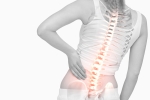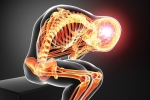Home »
Blog » Back Pain
| Stem Cell, PRP, Acupuncture in Queens & Long Island, New York
Back Pain | Stem Cell, PRP, Acupuncture in Queens & Long Island, New York
Tags: Back Pain | Posted on: 29-Jul-2020 | No of views: 3416 Researchers gave patients VR devices to see if it could help make them more comfortable. Virtual reality (VR) is quickly transforming the healthcare industry, changing the way patients and doctors receive and give care. Some pregnant women are experimenting with VR headsets to ease the pains of childbirth. And in 2017, burn victims started using VR gaming to lessen the excruciating pain of having their bandages changed. Now new research from Cedars-Sinai Medical Center supports the growing belief that therapeutic VR can safely and effectively reduce severe pain in hospitalized patients.
Read more
Tags: Back Pain | Posted on: 27-Jul-2020 | No of views: 3764 Difficulty sleeping is a common source of frustration that I often hear from patients. While pain often causes insomnia, studies suggest that the reverse may be true as well as not enough sleep can lead to more pain. In fact, some researchers now believe that a good night’s rest can serve as a powerful pain reliever.
Read more
Tags: Back Pain | Posted on: 22-Jul-2020 | No of views: 5394 Exercises that help ease lumbar herniated disc pain can be difficult to find especially if you’re looking for ones you don’t have to perform lying on the floor. If you find it more comfortable to stand up or sit in a chair while you exercise, here are 3 beginner-level exercises you can try. Check with your doctor for his or her recommendations first.
Waiter’s Bow - The waiter’s bow is a standing exercise that strengthens the muscles in your buttocks, which makes things easier on your lower back. For support, you can do this exercise with your hands placed on a tall bed or stool in front of you.
Read more
Tags: Back Pain | Posted on: 20-Jul-2020 | No of views: 3754 Pain can entirely change our lives. Ongoing pain problems can lead to disabilities like not being able to work, drive, or even maintain a home. Pain in a dominant hand or arm can make it difficult to button a shirt, comb hair, or carry groceries. Low back pain can make it hard to sit, stand, bend, tie shoelaces, or just about anything else you can imagine. Intense, recurring headaches, like migraines, can make it difficult to concentrate, listen, read, eat, or even turn the lights on. This kind of pain – ongoing and significantly interfering with important life activities – is called high-impact chronic pain.
Read more
Tags: Back Pain | Posted on: 17-Jul-2020 | No of views: 3978 In some cases of osteoporosis, one or more vertebral bones can become so weak that they cannot fully support their load and develop tiny cracks. This type of fracture, called a vertebral compression fracture, can be painful and sometimes leads to worsening symptoms, such as tingling, numbness, weakness, or spinal deformity (kyphosis). Fortunately, you can take steps to lower your risk for vertebral compression fractures, as well as seek treatment if one occurs.
Read more
Tags: Back Pain | Posted on: 10-Jul-2020 | No of views: 3797 When upper back pain has lingered or not responded to rest and other self-care methods, a medical professional may be needed to develop a treatment plan that can reduce the pain.
Nonsurgical Medical Care for Upper Back Pain - Some of the more common medical treatments for upper back pain include:
Physical therapy. A physiatrist, physical therapist, or other qualified medical professionals can design a physical therapy program to meet the patient’s specific needs. Most physical therapy programs for upper back pain focus on strengthening and stretching the upper back’s muscles, as well as neck muscles above and core muscles below. Physical therapy starts gradually and typically progresses over a period of a few weeks or months, at which point the patient can switch to a maintenance program at home.
Read more
Tags: Back Pain | Posted on: 08-Jul-2020 | No of views: 4682 According to the American Academy of Pain Medicine, chronic pain affects approximately 100 million U.S. adults and costs $560 to $635 billion per year in direct medical treatment costs and lost productivity. Talk about a painful pill to swallow. Exercise is a common treatment for chronic pain. Depending on your current state of health, it may help decrease inflammation, increase mobility, and decrease overall pain levels, no additional medication required. Try a combination of the cardio, relaxation, stretching, and strength exercises below and you may feel some of your pain ease away over time.
Read more
Tags: Back Pain | Posted on: 03-Jul-2020 | No of views: 3714 If upper back pain develops without any signs of an emergency, most people can safely try to alleviate the pain on their own. Several self-care treatments for upper back pain exist. In some cases, a combination of one or more treatments is needed to help reduce the pain.
Read more
Tags: Back Pain | Posted on: 01-Jul-2020 | No of views: 3697 Treating chronic pain - Recognizing that chronic pain is a problem is the first step in finding treatment. Start by talking to your doctor about chronic pain symptoms. Together you can identify the source of the pain and come up with a comprehensive treatment plan that takes into account your overall health and lifestyle. Over-the-counter (OTC) and prescription medications are often used to manage pain. However, for many people, a combination of treatments is most effective.
Read more
Tags: Back Pain | Posted on: 29-Jun-2020 | No of views: 3516 As a doctor who sees firsthand the damage that chronic pain creates in people’s lives, I believe improving how we treat pain is the single most important public health challenge that we face but not because of the opioid crisis or the $ 600 billion spent each year on treating pain and lost productivity. From my perspective, chronic pain’s most devastating effect, hidden just below the surface of all the tragic stories, is its impact on our most essential core need love.
Read more
Love this Post? Spread the World






















